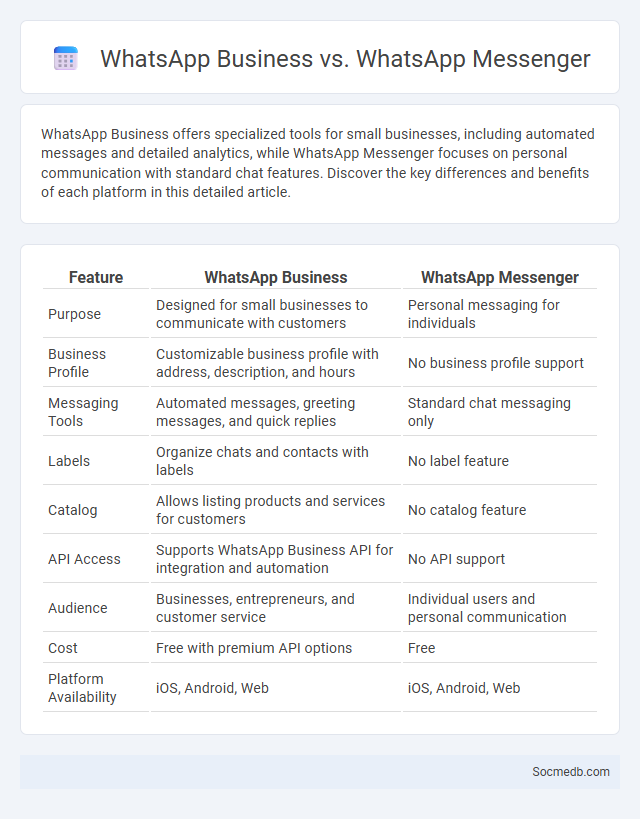
Photo illustration: WhatsApp Business vs WhatsApp Messenger
WhatsApp Business offers specialized tools for small businesses, including automated messages and detailed analytics, while WhatsApp Messenger focuses on personal communication with standard chat features. Discover the key differences and benefits of each platform in this detailed article.
Table of Comparison
| Feature | WhatsApp Business | WhatsApp Messenger |
|---|---|---|
| Purpose | Designed for small businesses to communicate with customers | Personal messaging for individuals |
| Business Profile | Customizable business profile with address, description, and hours | No business profile support |
| Messaging Tools | Automated messages, greeting messages, and quick replies | Standard chat messaging only |
| Labels | Organize chats and contacts with labels | No label feature |
| Catalog | Allows listing products and services for customers | No catalog feature |
| API Access | Supports WhatsApp Business API for integration and automation | No API support |
| Audience | Businesses, entrepreneurs, and customer service | Individual users and personal communication |
| Cost | Free with premium API options | Free |
| Platform Availability | iOS, Android, Web | iOS, Android, Web |
Introduction to WhatsApp: Messenger, Business, and Business Account
WhatsApp is a widely used messaging platform enabling instant communication through text, voice, and video calls globally. Its WhatsApp Business application caters specifically to small and medium enterprises, offering tools for customer interaction, automated messaging, and product catalog management. The WhatsApp Business Account allows companies to establish a professional presence, enhancing customer engagement and streamlining support services.
Key Differences: WhatsApp Messenger vs WhatsApp Business
WhatsApp Messenger primarily serves personal communication with features like voice calls, video calls, and text messaging targeted at individual users. WhatsApp Business includes specialized tools for small businesses, such as automated messages, business profiles, and catalog listings designed to improve customer interaction. You can leverage WhatsApp Business to enhance your customer service while WhatsApp Messenger remains ideal for everyday chatting with friends and family.
What Is a WhatsApp Business Account?
A WhatsApp Business account is a specialized profile designed for companies to communicate efficiently with customers through WhatsApp's platform. It provides tools like automated messages, business catalogs, and quick replies to enhance customer service and streamline interactions. You can use this account to build trust and offer personalized support, making it an essential asset for modern business communication.
Features Comparison: Messenger vs Business vs Business Account
Messenger offers seamless real-time communication with features like instant messaging, voice and video calls, and easy integration with Facebook contacts. Business accounts provide enhanced tools for brand presence, including customizable profiles, analytics, and customer engagement options tailored for marketing and sales. Messenger for Business combines these functions, enabling direct customer interactions alongside business management tools such as automated responses, appointment booking, and payment processing.
User Interface and Experience Overview
An intuitive user interface enhances your social media experience by streamlining navigation and content discovery across platforms like Facebook, Instagram, and Twitter. Features such as customizable feeds, responsive design, and interactive elements improve engagement and accessibility for diverse user needs. Optimized user experience leads to increased time spent on social media, higher interaction rates, and overall satisfaction.
Target Users: Personal vs Business Use Cases
Social media platforms cater to distinct target users, offering tailored features for personal and business use cases. Personal users prioritize connectivity, entertainment, and self-expression, while businesses leverage social media for brand awareness, customer engagement, and targeted advertising. Understanding your needs ensures optimal platform choice and strategy to maximize social media effectiveness.
Privacy, Security, and Data Handling
Social media platforms collect vast amounts of personal data, making privacy and data handling critical concerns for users. Your information can be vulnerable to breaches if security measures like encryption and two-factor authentication are not prioritized by the platform. Protecting your privacy requires understanding how your data is stored, shared, and used by social media companies.
Pricing and Monetization: Free vs Paid Options
Social media platforms offer both free and paid options to cater to diverse user needs and business goals. Free versions typically provide basic features with ad-supported content, while paid subscriptions remove ads and unlock premium tools such as advanced analytics, increased storage, and enhanced privacy settings. Monetization strategies include in-app purchases, promotional content, and tiered subscription models to maximize revenue and user engagement.
Integration With Other Tools and APIs
Social media platforms offer seamless integration with a wide range of tools and APIs, enhancing functionality and streamlining workflows. By connecting your social media accounts with analytics, marketing automation, and customer relationship management (CRM) systems, you can gain deeper insights and improve engagement strategies. Leveraging these integrations allows you to automate posting, track performance, and synchronize data across multiple channels efficiently.
Choosing the Right WhatsApp Solution for Your Needs
Selecting the right WhatsApp solution hinges on understanding your communication goals, whether for personal use, small business engagement, or large-scale customer support. Consider WhatsApp Business API for scalable messaging, advanced automation, and integration with CRM systems to enhance customer interaction. You benefit most by evaluating features like message templates, security protocols, and cost-effectiveness aligned with your specific needs.
 socmedb.com
socmedb.com